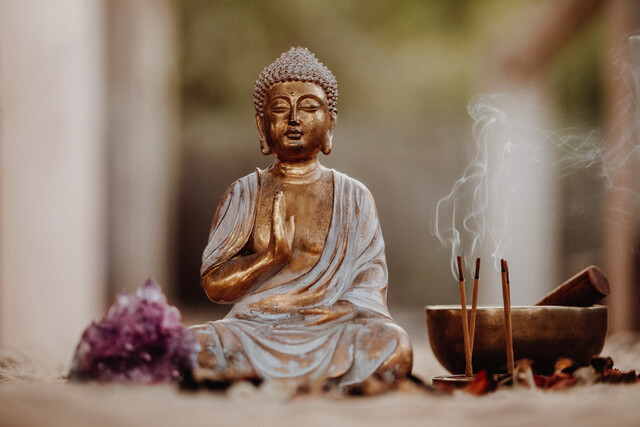Online Class: Hinduism 101 — An Introduction

no certificate
with CEU Certificate*
-
19Lessons
-
26Exams &
Assignments -
517Students
have taken this course -
11Hours
average time -
1.1CEUs
Course Description
This course provides a panoramic view, inviting participants to immerse themselves in the rich tapestry of beliefs, practices, and traditions of Hinduism that have shaped and sustained countless generations.
While Hinduism's roots run deep, its teachings are universal, transcending time and borders. You'll traverse its origins in the sacred Indus Valley, where the bedrock of the religion was laid. Through illuminating lectures, we'll delve into the intricacies of the Veda and the noble precepts of Dharma, guiding principles that form the very essence of Hindu thought.
As you advance, you'll uncover pivotal concepts like Karma, which governs the cyclical nature of life, and delve into the spiritual significance of mantras and tantras. Through captivating narratives, you'll meet an ensemble of deities, each with their unique lore, and understand the festivals that honor them, painting a vibrant tableau of celebrations that resonate deeply with millions even today.
Navigate the realms of Hindu beliefs to gain insights into profound ideologies like predestination and reincarnation, pivotal doctrines that have been instrumental in molding Hindu societies through millennia. From there, we journey into the heart of Hindu daily life, understanding the sanctity of customs, from rites of passage to dietary traditions. Dive deeper into the serene world of Yoga, a cornerstone of Hinduism, resonating with holistic well-being.
Central to our exploration will be the revered spaces of worship -- temples, and the pivotal roles of Hindu priests. You'll experience the ebb and flow of rituals, ceremonies, and the joyous spectacles that are Hindu festivals.
In a tribute to the indomitable spirit of women in Hinduism, we shine a spotlight on the iconic women who have left an indelible mark on India's historical and contemporary tapestry. As we near the culmination of our journey, we'll explore how Hinduism, with its timeless wisdom, interfaces with the modern world, continually evolving yet steadfast in its core beliefs.
Concluding our course, we emphasize Hinduism's enduring quest - the pursuit of peace, harmony, and universal brotherhood. This isn't just a doctrine for Hindus, but a clarion call to humanity, urging a harmonious coexistence amongst all faiths and cultures.
So, are you ready to embark on this transcendent journey, to glimpse the soul of a religion that has shaped civilizations, inspired thinkers, and offered solace to seekers? Join us and enrich your worldview with the timeless wisdom of Hinduism.
- Completely Online
- Self-Paced
- Printable Lessons
- Full HD Video

- 6 Months to Complete
- 24/7 Availability
- Start Anytime
- PC & Mac Compatible
- Android & iOS Friendly
- Accredited CEUs

Course Lessons
Lesson 1. Hinduism: An Overview
Hinduism's rich history began in the ancient Indus Valley and evolved through diverse cultural influences, with sacred texts like the Vedas and Upanishads forming its spiritual backbone. Despite its lack of a central figure, Hinduism's pluralistic nature thrives on continuous change, reflected in its flexible principles and enduring traditions.Lesson 2. Hinduism's Evolutionary Path: From Ancient Sages to Modern Mystics
Hinduism's evolution, rooted in the spiritual fabric of the Indus Valley, highlights its adaptability through the influences of the Aryans, who introduced elements that have since become integral to its structure. With over a billion followers worldwide, Hinduism's rich tapestry continues to impact cultures across the globe, blending ancient wisdom with modern practices like yoga and mindfulness.Lesson 3. From Varna to Caste: Understanding Indo-Aryan Social Dynamics
The spiritual and hierarchical frameworks of Indo-Aryan society have historically impacted India, with the parliamentary system drawing parallels to feudal Europe's class stratifications. Efforts for social change reflect a timeless quest for balance between tradition and modern equity.Lesson 4. The Vedas: Pillars of Hindu Philosophy
Despite its appearance as polytheistic due to myriad deities, Hinduism is fundamentally monotheistic, centered around the singular cosmic spirit Brahman. These deities represent aspects of life, allowing personal connection with the divine while emphasizing unity within diversity.Lesson 5. Understanding Karma: A Spiritual and Ethical Adventure
Hindu philosophy teaches that suicide disrupts the karmic cycle, heightening unresolved issues in future lives, urging individuals to embrace life's challenges as part of their spiritual journey. This perspective fosters a message of resilience, underscoring the importance of completing the karmic lessons each life presents.Lesson 6. Vedanta and the Quest for Universal Truth
Hinduism's diverse sacred texts, such as the Vedas and the Upanishads, offer profound insights into spirituality, philosophy, and human existence across centuries. These texts are divided into Shruti and Smriti, with Shruti comprising divinely revealed wisdom and Smriti providing societal context and evolved interpretations.Lesson 7. Deities and Incarnations: The Dualism of Hindu Divinity
The exploration of divine incarnations (avatars) in Hinduism highlights Ishvara's compassionate intervention in restoring cosmic order and guiding humanity. These avatars, embodied in tales and texts like the Bhagavad Gita, illustrate profound truths about duty, morality, and the inherent potential within humanity for spiritual growth.Lesson 8. Exploring the Philosophies of Predestination and Reincarnation
Hindu goals for life—moksha, dharma, artha, and kama—offer a framework for spiritual and material balance, aiming for liberation from rebirth. These are pursued through paths like Jnana, Raja, Bhakti, and Karma Yoga, aligning actions with divine purpose.Lesson 9. The Vibrant Tapestry: Understanding Hindu Traditions and Their Evolution
Hinduism's sacred texts, the Vedas, underpin traditional rituals while its epic narratives inspire philosophical discourse, defining its cultural and moral landscape. This blend of ritual and story continues to instruct personal conduct and community ethics in today's world.Lesson 10. Paths of Yoga: Uniting the Mind, Body, and Spirit
Rooted in Hinduism, yoga unites individuals with divine essence through practices such as Raja yoga's mental concentration and Karma yoga's selfless actions. Its versatility transcends cultural boundaries, supporting holistic wellness and spiritual growth worldwide.Lesson 11. Decoding Mantras and Gunas
Mantras in Hinduism act as vibrational conduits to the divine, with 'Om' symbolizing creation, preservation, and destruction within the cosmic order. The concept of gunas presents a nuanced lens on human nature, emphasizing the need for balancing purity, passion, and calmness for spiritual advancement.Lesson 12. Temples & Priests: Anchors of Hinduism
The evolution of Hindu temples from simple worship spaces to majestic architectural marvels mirrors the transformative journey of the Hindu priesthood, which adapts to meet spiritual and communal needs. These sacred sites continue to serve as beacons of cultural heritage, guiding devotees on their spiritual paths.Lesson 13. Sacred Rites and Celebrations in Hindu Culture
In a Hindu's life, samskaras like Upanayana or thread ceremony and funeral rites manifest as transformative practices connecting individuals to dharma and spiritual duty. The rites embrace change, purity, and interconnectedness, ultimately reflecting the belief in rebirth and universal continuance.Lesson 14. Hindu Festivals: Tradition and Spiritual Celebration
The core of Hindu festivals lies in their ability to unify diverse beliefs and practices, linking ancient traditions with modern interpretations to foster community solidarity. Through cultural exchanges and innovative adaptations, these celebrations retain their essence while inviting participation across various backgrounds, promoting unity in diversity.Lesson 15. The Evolution of Hindu Women's Roles Through Time
In ancient Hindu society, women were held in high esteem and given equal status with men, often excelling in education and participating actively in important societal roles. Despite facing setbacks due to foreign invasions, their enduring resilience and contributions have continued into modern times, with many Hindu women playing pivotal roles in India's progress.Lesson 16. Holistic Nutrition in Hindu Practices
Hindu cuisine intertwines dietary practices with spiritual principles, celebrating food as a sacred part of life that fosters purity and enlightenment. Ahimsa, nonviolence, is key, influencing a widespread preference for vegetarianism and shaping the ethical framework of daily meals.Lesson 17. Politics and Spirituality: Hinduism's Modern Landscape
The adaptability of Hinduism has led to its global cultural integration, with practices like yoga and festivals such as Diwali gaining broader recognition. This adaptability reflects the balance between tradition and modernity, promoting inclusivity and understanding.Lesson 18. Exploring Harmony Through Hinduism's Teachings
The Bhakti movement in Hinduism, emphasizing personal devotion over ritualism, has been a unifying force, breaking social barriers through faith expressed in song, poetry, and communal celebrations. Figures like Meerabai and Kabir exemplify this tradition, inspiring unity and love that transcend time and cultural boundaries.Lesson 19. Discovering Hinduism: Philosophies, Practices, and Modern-Day Impact
Rituals and practices in Hinduism, such as Puja and Yoga, reflect its diverse spiritual expressions. Festivals like Diwali and Holi, alongside life passages marked by Sanskaras, reinforce the sacredness of life's journey and communal unity found in temple worship.
Learning Outcomes
- Define and describe the core concepts of Hinduism, including karma, reincarnation, and dharma, and explain their impact on individual spiritual development.
- Identify and analyze the major deities within Hinduism's pantheon, including Brahma, Vishnu, and Shiva, and evaluate their symbolic significance within the religion's beliefs and practices.
- Define the influence of the Aryan migration on the cultural and religious development of the Indian subcontinent, identifying key contributions to the evolution of early Hindu beliefs.
- Describe the societal and urban planning innovations of the Indus Valley Civilization, recognizing the impact of these advancements on modern sustainable development practices.
- Describe the transition from the original varna classifications to the rigid caste system, identifying factors contributing to its evolution and contemporary relevance.
- Recognize the origins and development of Indo-Aryan society and the historical roots of the caste system, assessing their socio-cultural impact.
- Define the concept of Brahman and its significance in Hinduism, recognizing its role as the universal spirit manifesting as diverse deities.
- Describe the core principles of Dharma within Hindu philosophy, identifying its dual role as both a cosmic order and personal duty.
- Define karma in Hinduism and describe its impact on ethical behavior and decision-making across lifetimes.
- Explain the concept of reincarnation and its role in understanding karmic influence on life's challenges and personal growth.
- Identify and describe the significance of the four Vedas and their role in Hindu philosophy.
- Recognize and differentiate between the concepts of Shruti and Smriti in Hindu sacred texts.
- Define the role of Ishvara in Hinduism as the Personal God and explain the manifestations of Vishnu and Shiva as expressions of this supreme being.
- Demonstrate mastery of lesson content at levels of 70% or higher.
Additional Course Information

- Document Your Lifelong Learning Achievements
- Earn an Official Certificate Documenting Course Hours and CEUs
- Verify Your Certificate with a Unique Serial Number Online
- View and Share Your Certificate Online or Download/Print as PDF
- Display Your Certificate on Your Resume and Promote Your Achievements Using Social Media

Choose Your Subscription Plan
No Certificate / No CEUs
This course only
| Includes certificate | X |
| Includes CEUs | X |
| Self-paced |

|
| Instructor support |

|
| Time to complete | 6 months |
| No. of courses | 1 course |
Certificate & CEUs
This course only
| Includes certificate |

|
| Includes CEUs |

|
| Self-paced |

|
| Instructor support |

|
| Time to complete | 6 months |
| No. of courses | 1 course |
Certificates & CEUs
Includes all 600+ courses
| Includes certificate |

|
| Includes CEUs |

|
| Self-paced |

|
| Instructor support |

|
| Time to complete | 12 Months |
| No. of courses | 600+ |
Certificates & CEUs
Includes all 600+ courses
| Includes certificate |

|
| Includes CEUs |

|
| Self-paced |

|
| Instructor support |

|
| Time to complete | 24 Months |
| No. of courses | 600+ |
Student Testimonials
- "Mac is an amazing instructor. He is always available and always positive comments and when I don't quite understand something, he is very patient in explaining it so that it is easily understood." -- Diana C.
- "Thanks. I had wanted to learn more about Hinduism and this course gave me the information I needed about the religion and culture. I understand karma and the different types of religious practices much better now. Great course." -- Tama V.





